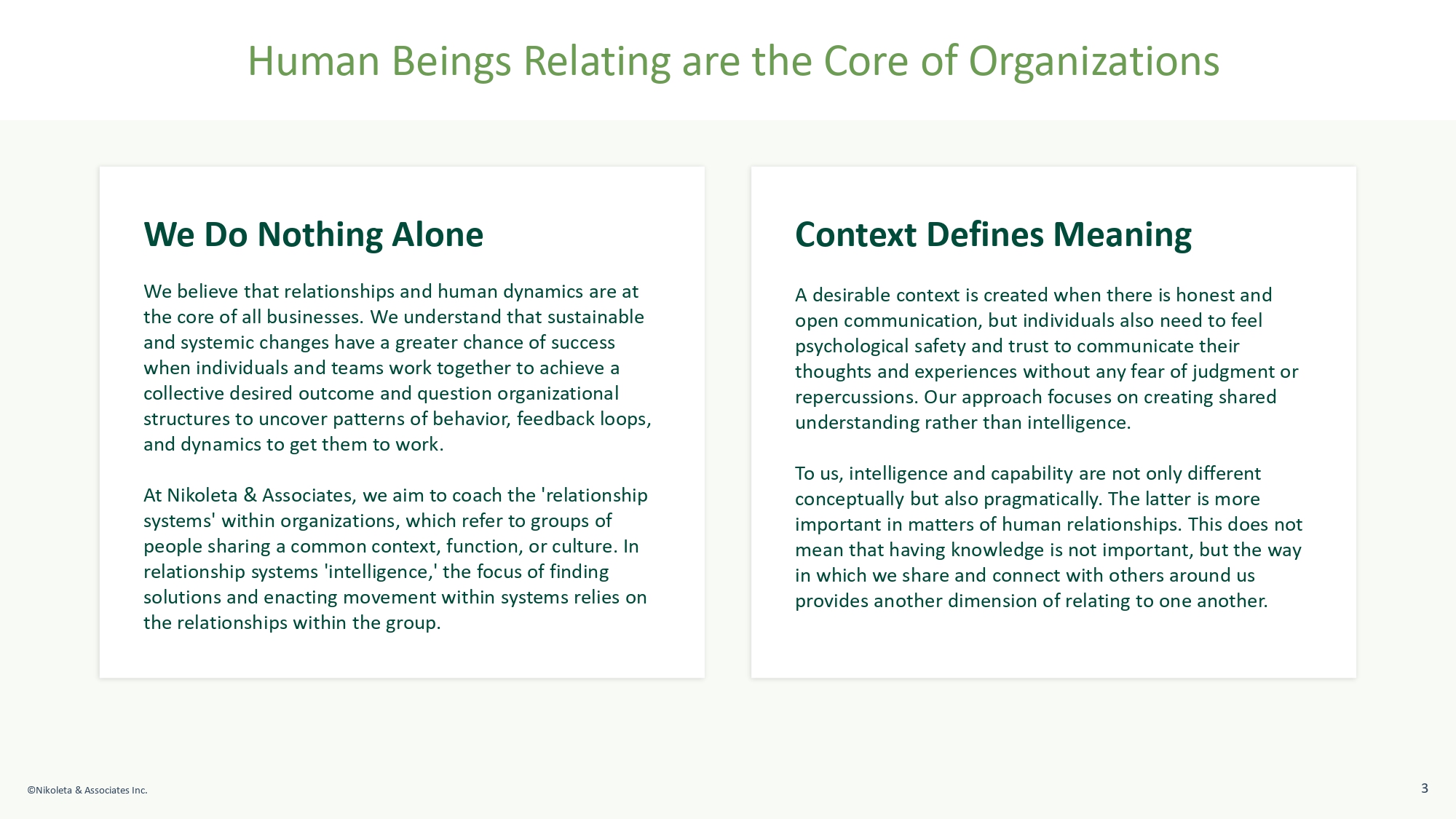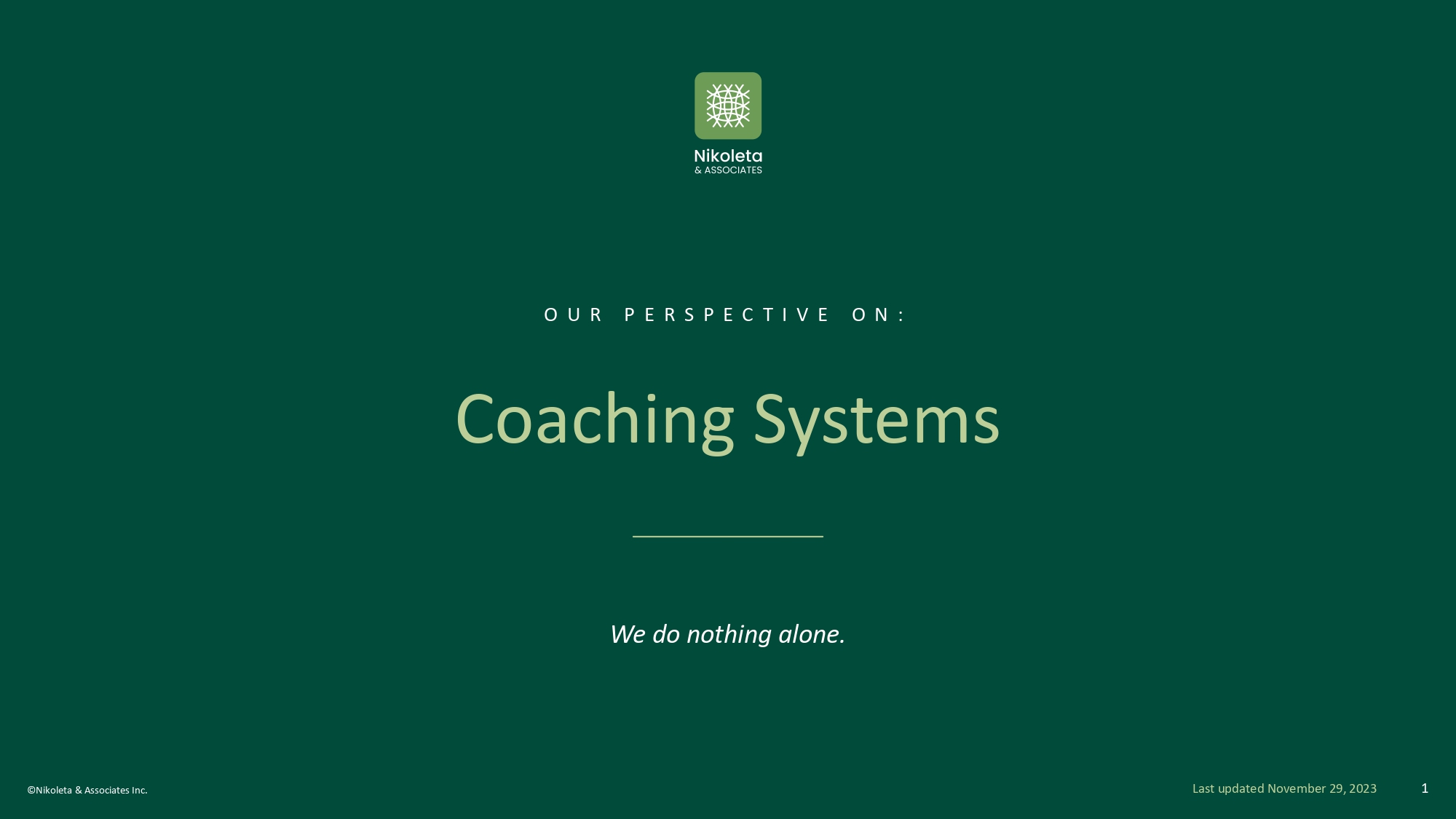Knowledge Kernel
Coaching Systems


Coaching to an Organization revolves around team-focused strategies, rather than a strict emphasis on individuals.
At Nikoleta & Associates, we integrate the concept of systems coaching into our Coaching to an Organization approach. This approach is aligned with systems thinking, and it presupposes that all parts of an organization contribute to the success of both individuals and teams.
In societies predominantly oriented towards independence, the awareness of interdependence often needs to be fostered. That’s why our approach targets the connections between team members, instead of solely concentrating on the individuals. In some situations, this approach can be used to resolve particular challenges, such as establishing a shared vision, leading change, or bridging silos between cross-functional teams.
Successful coaching commonly requires two elements: the capacity to influence the system and the system’s amenability to influence. Traditional coaching often overemphasizes the executive role in implementing changes. However, at Nikoleta & Associates, we acknowledge that individuals in various roles can contribute to organizational change. Even the smallest changes can have a significant impact.
We impact systems and vice versa, and often systemic issues include multiple factors beyond an individual’s own motivation and skills. Elements such as the organizational environment, design, and work culture can influence an individual’s ability to achieve and drive business results.
When a team collaboratively designs solutions to its core problems and aspirations, it fosters commitment and ownership of the process.
Systems coaching utilizes a systems thinking approach to coach intact teams, instead of individuals. By focusing on the connections between team members, this approach facilitates better understanding of individual roles within the team and the influence of their behaviors on each other.
We Do Nothing Alone
We hold the belief that relationships and human dynamics are at the heart of all businesses. Sustainable and systemic changes are more likely to succeed when individuals and teams work together towards a common goal and jointly question organizational structures to uncover behavioral patterns, feedback loops, and dynamics.
At Nikoleta & Associates, our coaching focuses on the ‘relationship systems’ within organizations, encompassing groups of people who share a common context, function, or culture. The focus is on finding solutions and initiating movement within systems based on the relationships within the group.
Context Defines Meaning
A desirable context, one where honest and open communication flourishes, requires individuals to feel psychologically safe and trustful enough to share their thoughts and experiences without fear of judgment or repercussions.
Our approach fosters shared understanding, rather than simply intelligence. We consider intelligence and capability as different, with the latter being more critical in matters of human relationships. This does not discount the importance of knowledge, but emphasizes that the way we share and connect with others provides a richer dimension of relating to one another.
Three Experience-Shaping Design Considerations
Communicate and Demonstrate Relevance of Coaching
Leaders need to embody and apply coaching practices themselves to weave it into the organizational culture. The benefits to the organization should be communicated through both discussion and action.
Coaching needs to be actively incorporated into meetings, strategic discussions, and informal conversations. While many organizations introduce systems coaching to underperforming teams, our belief is that this approach should be implemented when any team is first formed for improved communication, alignment, decision-making, and high performance.
Foster a Learning Culture
Promote a culture of learning by providing regular opportunities for teammates at all levels to learn, develop, and practice (in-person or virtual formats). Establish a personalized alignment plan, create actions, and provide support to facilitate the transition.
For example, some companies offer a coaching program followed by small group sessions, while others utilize reporting systems and online coaching platforms or apps. The ultimate goal is to establish a system that enables everyone to apply learnings and check in frequently.
Develop Ownership
Encouraging ownership enables team members to take responsibility for their performance and encourages managers to play their role, which includes coaching their team. Ensure this by involving team members at all levels in coaching conversations regularly.
To effectively use this approach, managers often need to learn how to coach and engage their team members. Transparency regarding coaching efforts in your organization should be a key aim.














